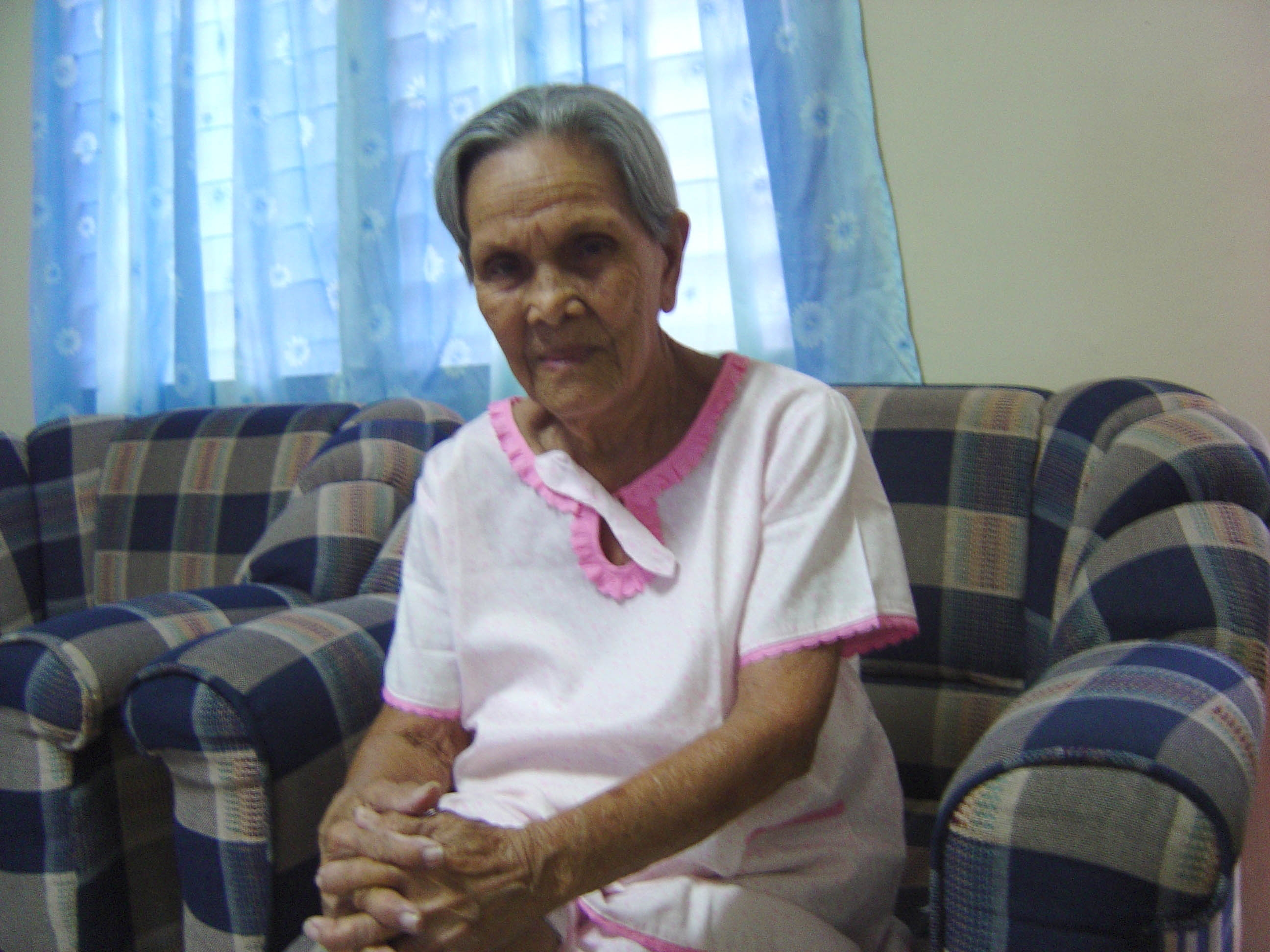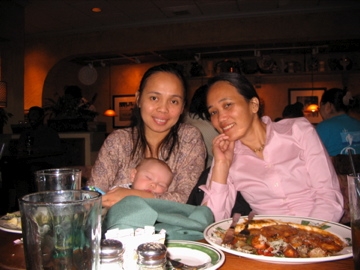April 27, 2007
Heartaches of the Sandwich Generation
I came across an interesting article back in February which debunks a common misconception in the Philippines that most Americans would dump their aging parents in nursing homes out of convenience. This is not to say that it’s not happening, but it would be unfair to lump everyone in the category of people who refuse or choose not to personally look after their elderly folks.
The idea of a nursing home does not sit well with many traditional families in the Philippines. To most of us, it is unacceptable to absolve ourselves of the responsibility of taking care of our own parents. This is so ingrained in our culture that we face disparagement by society if we decide to do otherwise regardless of our reasons.
My mother, for a time, was part of the Sandwich Generation. It is a generation caught in the middle of raising their own family and taking care of their aging and often sick parents. The years my grandparents lived with us put us on a rough, emotional ride, but one which we wholeheartedly embraced. I don’t think we could have lived with the regrets and excuses had we chosen the easier route. My Lolo died when he was 92 and Lola passed away a couple of years later. She was 88.
I have a lot of fond memories of my grandfather. Over time I saw him transform from a robust farmer who was up by dawn to tend to the fields to a sickly man confined to a wheelchair in the last few months of his life. One of his proudest moments was seeing me graduate from the university and pursue a career in the media. In spite of the demands of my job and the exhausting trip from one island to another, I made it a point to go home at least once a month. As an “apo” (grandchild), I never understood why his other children could not find time to pay him a visit. There were always excuses that almost always bordered on the ridiculous. One daughter told us she couldn’t leave her pigs.
My grandfather had an odd way of making me feel special as a kid. He likened my face to an ensaimada, a type of pastry topped with grated cheese and sugar, probably not in reference to the roundness of my face but what he considered to be a rather wide forehead. Then he would try to soothe my bruised feelings by saying prominent foreheads are an indication of high intellect. He had predicted once that I’d probably just end up selling “kamote” (sweet potatoes) at the market because among my siblings, I was the shortest, the darkest and the most prone to illness. On the other hand, he would brag about my being in the honor roll to relatives who cared to listen. Somehow seeing me close to tears whenever he was in one of those jesting moods gave him sheer pleasure. Strangely though, I never hated him. I just wanted to prove to him I had no intentions of becoming a “tindera” (salesgirl).
The last time I saw him alive he was wheelchair-bound and hardly eating. He had even turned away from his favorite fruit – mango. I knew then that things were turning for the worst. He told me he was tired and pleaded for us to not bring him to the hospital again. I jokingly told him St. Peter wasn’t ready for him yet and he forced a weary smile. I said I needed him to be present at my wedding and he protested, “But that would be a long time from now!” That was the last time he poked fun at me.
The lingering image that I have of my grandfather is not the old man on comatose in the ICU or the cold body I embraced at the morgue. It is of him sitting on the porch in t-shirt and pajamas smiling and waving at me as I was leaving my parents’ house to go back to my job.
Surprisingly at the funeral, all of his children showed up. Hours after the burial they started asking about how to divide his property. My family was exhausted, bitter and angry. I was unforgiving. I have witnessed how my mother almost single-handedly cared for my grandparents, from feeding them to bathing them. I have witnessed how my aunts and uncles broke my grandparents’ hearts over and over again when they said they couldn’t visit because they were too busy.
The heartaches of caring for someone you love and not having the support you expect from the rest of the family were reawakened when my grandmother fell ill. We heard the same excuses. Again, we found ourselves emptying our pockets and borrowing money to make sure she gets the best medical attention. Again we ran out of explanations for the absence of her other children. Once she insisted on staying with an aunt and she couldn’t understand why we wouldn’t let her go. She didn’t know she was unwanted.
My family was enraged when the aunts and uncles who absconded from the responsibility of looking after their dying parents showed up at the interment in full display of their grief. We were emotionally drained. We have cut off our ties with my mother’s side of the family since then.
My grandmother would have turned 89 on May 5th. She was always proud of her age. When I think of her I am reminded of the mornings when she would go outside the house and exercise, waving her wrinkled arms in the air and shouting, “Praise the Lord!” Memories take me as far back as when I was seven years old and she was teaching me the words to Cecil Alexander’s poem “All Things Bright and Beautiful.”
In my mind, Lola will always be dancing (she was a very sought-after belle of the ball in her younger years) and singing. Lolo will always be sitting on a bench listening to Victor Wood’s songs on lazy afternoons. It only pains me to think that even toward the last days of their lives they were unbelieving, and yet forgiving, that their other children had abandoned them.
April 25, 2007
Defeat of the Wizards
I went to my first NBA game on April 15th at the Verizon Center and the husband was apologetic for the miserable outcome. The home team, Washington Wizards, did not only lose – they got beat up pretty bad. The Wizards were pummeled and hammered by the Chicago Bulls minute after minute that watching the game was like having a toothache. The agonizing finish: 101-68. What a dismal showing for the Wizards. Since the end was inevitable, I warded off boredom by taking these photos.
YEAR OF THE MINI-ME'S
On the 19th, a longtime friend of mine from New York came to town with her husband who was giving a lecture on early cinema. We had been talking about this reunion of sorts since I got here September last year, babbling on the phone how quickly time flies and how we miss our coffee-drinking nights at Brews (where we passed time unloading our sentiments on life and watching prostitutes go about their business).
So two years since our last meeting in Cebu, there we were in the middle of DC prattling in Cebuano non-stop. The most anticipated part of the reunion, however, was meeting the newest addition to her family – five-month old Juan, gray eyes and all. There is nothing more indicative of life in transition than seeing your friend with a diaper bag. Or breastfeeding in public. Motherhood is a badge she now proudly wears and she is evidently happy. True to Bisaya form, she calls the boy “Dodong” during moments of endearments. Poor Juan, his nose was the subject of scrutiny as his mother and I tried to determine if he'd been spared from inheriting the famous Filipino pug nose.
Lugging Juan with us, we later went to the Phillips Collection to catch the “Moving Pictures: American Art and Early Film” exhibit and had dinner with the husband and our own little resident at an Italian restaurant.
On the same week, we reconnected with a friend we have not heard of the last three of four years. We often wondered if she was swallowed in the jungles of Mindanao. Well, she’s resurfaced in the city with a man and a six-month-old bump on the stomach. We both shocked each other with developments in our lives.
Ms. B: Whaaaaatt? You cook and iron clothes now?
Me: Egad! You’re married and pregnant?
Our friendship began in a weird way and to this day neither one of us knows how we thrust aside the hostility that came with first impressions. It was good to talk to her again and even better to know that she’s doing all right. I passed on the news to the other members of the gang and hopefully soon they will be sitting down for coffee or tea just like old times.



